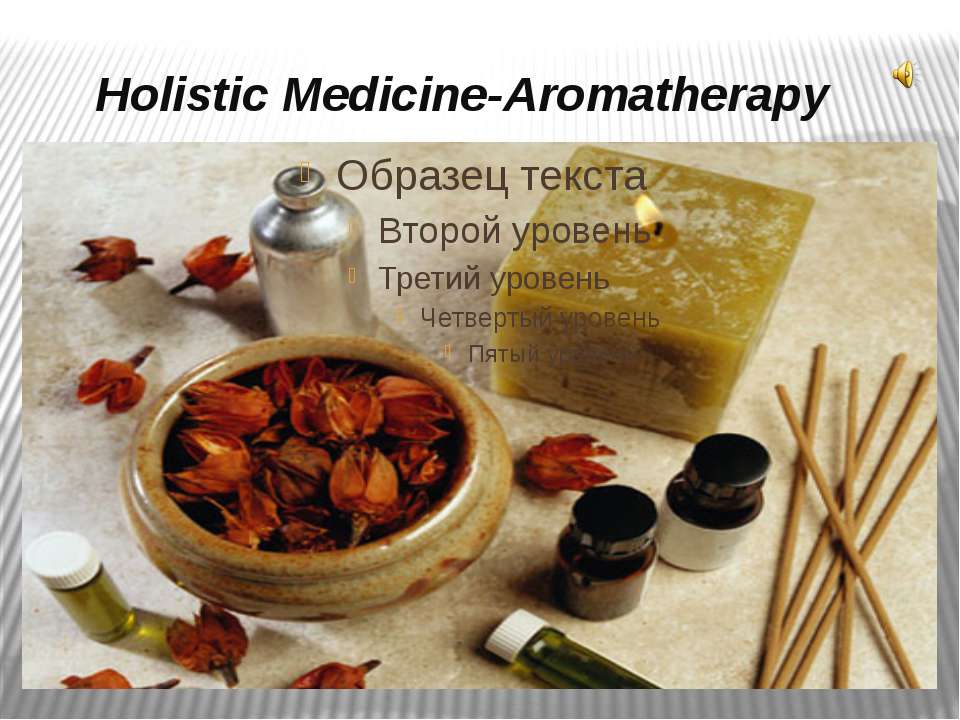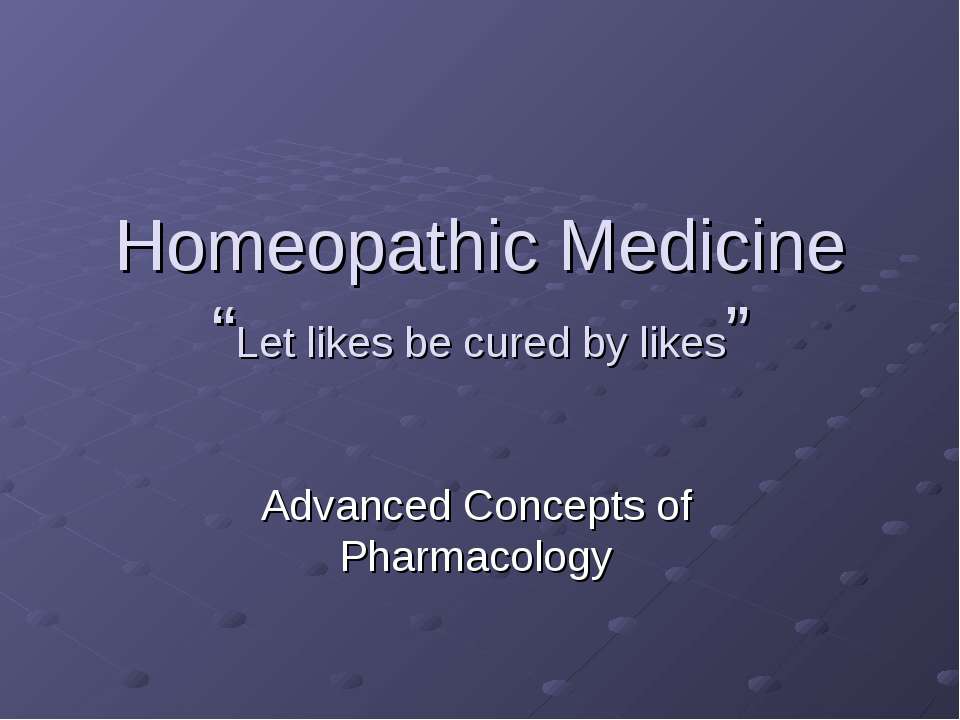Презентация - "Holistic Medicine - Aromatherapy"

- Презентации / Презентации по английскому языку
- 0
- 16.10.20
Просмотреть и скачать презентацию на тему "Holistic Medicine - Aromatherapy"
Сайт klass-uchebnik.com предлагает качественные учебные материалы для школьников, родителей и учителей. Здесь можно бесплатно читать и скачивать современные учебники, рабочие тетради, а также наглядные презентации по всем предметам школьной программы. Материалы распределены по классам и темам, что делает поиск максимально удобным. Каждое пособие отличается логичной структурой, доступной подачей материала и соответствует действующим образовательным стандартам. Благодаря простому языку, наглядным схемам и практическим заданиям, обучение становится легче и эффективнее. Учебники подойдут как для ежедневной подготовки к урокам, так и для систематического повторения перед экзаменами.
Особое внимание стоит уделить разделу с презентациями - они становятся отличным визуальным дополнением к теории, помогают лучше понять сложные темы и удерживают внимание учащихся. Такие материалы удобно использовать в классе на интерактивной доске или при самостоятельной подготовке дома. Все размещённые на платформе материалы проверены на актуальность и соответствие учебной программе. Это делает сайт надёжным помощником в образовательном процессе для всех участников: школьников, учителей и родителей. Особенно удобно, что всё доступно онлайн без регистрации и в свободном доступе.
Если вы ищете надежный источник для подготовки к урокам, контрольным и экзаменам - klass-uchebnik.com станет отличным выбором. Здесь вы найдёте всё необходимое, включая "Holistic Medicine - Aromatherapy", чтобы сделать обучение более организованным, интересным и результативным.
Plan What is Aromatherapy? History of Aromatherapy. The Aromatherapy Decoder. Which Problems can Aromatherapy Help? Types of Aromatherapy. Recipe of Aromatherapy.
Aromatherapy means "treatment using scents". It is a holistic treatment of caring for the body with pleasant smelling botanical oils such as rose, lemon, lavender and peppermint. The essential oils are added to the bath or massaged into the skin, inhaled directly or diffused to scent an entire room. Aromatherapy is used for the relief of pain, care for the skin, alleviate tension and fatigue and invigorate the entire body. Essential oils can affect the mood, alleviate fatigue, reduce anxiety and promote relaxation. When inhaled, they work on the brain and nervous system through stimulation of the olfactory nerves. The essential oils are aromatic essences extracted from plants, flowers, trees, fruits, bark, grasses and seeds with distinctive therapeutic, psychological, and physiological properties, which improve and prevent illness. There are about 150 essential oils. Most of these oils have antiseptic properties; some are antiviral, anti-inflammatory, pain-relieving, antidepressant and expectorant. Other properties of the essential oils which are taken advantage of in aromatherapy are their stimulation, relaxation, digestion improvement, and diuretic properties. To get the maximum benefit from essential oils, it should be made from natural, pure raw materials. Synthetically made oils do not work. Aromatherapy is one of the fastest growing fields in alternative medicine. It is widely used at home, clinics and hospitals for a variety of applications such as pain relief for women in labor pain, relieving pain caused by the side effects of the chemotherapy undergone by the cancer patients, and rehabilitation of cardiac patients.
History of Aromatherapy The burning of incense in ancient religious ceremonies is one of the first uses of aromatherapy.
Aromatherapy had been around for 6000 years or more. The Greeks, Romans, and ancient Egyptians all used aromatherapy oils. The Egyptian physician Imhotep recommended fragrant oils for bathing, massage, and for embalming their dead nearly 6000 years ago. Imhotep is the Egyptian god of medicine and healing. Hippocrates, the father of modern medicine, used aromatherapy baths and scented massage. He used aromatic fumigations to rid Athens of the plague. The modern era of aromatherapy is dawned in 1930 when the French chemist Rene Maurice Gattefosse coined the term aromatherapy for the therapeutic use of essential oils. He was fascinated by the benefits of lavender oil in healing his burned hand without leaving any scars. He started investigating the effect of other essential oils for healing and for their psychotherapeutic benefits. During world war II, the French army surgeon Dr. Jean Valnet used essential oils as antiseptics. Later, Madame Marguerite Maury elevated aromatherapy as a holistic therapy. She started prescribing essential oils as remedy for her patients. She is also credited with the modern use of essential oils in massage.
The Aromatherapy Decoder presents information on 36 essential oils. The information is spread across 4 easy to use rotating wheels, and is presented using words, as well as a clever symbolic referencing system.
Essential oils stimulates the powerful sense of smell. It is known that odors we smell have a significant impact on how we feel. In dealing with patients who have lost the sense of smell, doctors have found that a life without fragrance can lead to high incidence of psychiatric problems such as anxiety and depression. Studies with brain wave frequency has shown that smelling lavender increases alpha waves in the back of the head, which are associated with relaxation. Fragrance of Jasmine increases beta waves in the front of the head, which are associated with a more alert state.
Which Problems can Aromatherapy Help? Aromatherapy is particularly effective for stress, anxiety, and psychosomatic induced problems, muscular and rheumatic pains, digestive disorders and women's problems, such as PMS, menopausal complaints and postnatal depression. Here is a summary of the results from clinical studies:
Considerable evidence exists that fragrant compounds and aromatherapy have a profound effect on our mind and behavior. Animal studies have found that hyperexcited mice (as a result of consuming a large quantity of caffeine) was calmed by the aroma of lavender, sandalwood, and other oils sprayed into their cages. The same mice were found to become very irritable when exposed to the aroma of orange terpines, thymol, and some other substances. In a study reported in the British Medical Journal Lancet, elderly patients slept "like babies" when a lavender aroma was wafted into their bedrooms at night. These patients had complained of difficulty falling asleep and had to take sleeping pills to get sleep prior to the aromatherapy. Aromatherapy for Sleep Aromatherapy for Behavior
Types of Aromatherapy 1. Cosmetic Aromatherapy Adding essential oils to facial, skin, body, and hair-care products to tone, cleanse, dry, or moisturize the body. 2. Massage Aromatherapy Massage oil is supplemented with essential oils which have been selected based upon the client's needs. They are mixed into a massage oil or lotion, and worked into the skin via therapeutic massage. 3. Medical Aromatherapy With this method, a medical doctor prescribes essential oils, which can be taken internally. 4. Psycho Aromatherapy The use of essential oils to induce emotional states or moods including relaxation, invigoration, or pleasant memories. Scent is powerfully linked to emotion and memory, and pleasurable scents are useful in unlocking buried emotions, releasing stress, and promoting balance and harmony within the body. The oils are diffused throughout a room and inhaled directly or indirectly. This is the method you are using when you treat yourself with our scented candles. 5. Magical Aromatherapy Magical Aromatherapy is the use of essential oils, incense or candles to enhance ritual, intensify spiritual experiences, or act as a tangible sacrifice to a deity. This is the oldest form of aromatherapy and arguably the most effective. The oils connect us with the Divine, and by employing the specific essences which correspond with your objectives, along with creative visualization, (or prayer) you can give yourself a tremendous boost toward achieving any goal.
Recipe Of Aromatherapy Calming/Relaxing Aromatherapy Blend Ingredients: 1 ounce carrier oil such as sweet almond 10 drops Roman Chamomile 5 drops Lavender Directions: Mix the oils well and add to a clean, air-tight dark glass container. Massage gently into the feet of the individual who requires increased calm. Giving yourself a foot massage with this relaxing oil is also delightful. Roman Chamomile has a strong sedative effect, so do not plan to drive or concentrate after using this blend. If you prefer to make a diffuser blend, make a blend with a ratio of 2 drops Roman Chamomile to 1 drop Lavender and add to your diffuser.















